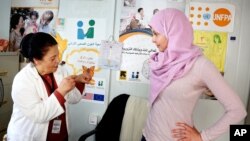The Trump administration said Monday it was cutting off U.S. funding to the United Nations agency for reproductive health, accusing the agency of supporting population control programs in China that include coercive abortion.
By halting assistance to the U.N. Population Fund, the Trump administration is following through on promises to let socially conservative policies that President Donald Trump embraced in his campaign determine the way the U.S. government operates and conducts itself in the world. Though focused on forced abortion — a concept opposed by liberals and conservatives alike — the move to invoke the "Kemp-Kasten amendment" was sure to be perceived as a gesture to anti-abortion advocates and other conservative interests.
The U.N. fund will lose $32.5 million in funding from the 2017 budget, the State Department said, with funds shifted to similar programs at the U.S. Agency for International Development. It wasn't immediately clear whether the U.N. fund would also lose out on tens of millions of additional dollars it has typically received from the U.S. in "non-core" funds.
Under a three-decade-old law, the U.S. is barred from funding organizations that aid or participate in forced abortion of involuntary sterilization. It's up to each administration to determine which organizations meet that condition. The U.N. Population Fund has typically been cut off during Republican administrations and had its funding resumed when Democrats control the White House.
The Senate Foreign Relations Committee was notified of the move by the State Department in a letter received Monday. The letter followed a formal designation by Tom Shannon, the State Department's undersecretary of political affairs, that said the fund "supports, or participates in the management of, a program of coercive abortion or involuntary sterilization."
In a lengthy memorandum obtained by The Associated Press, the State Department said the U.N. fund partners with China's National Health and Family Planning Commission, responsible for overseeing China's "two-child policy" — a loosened version of the notorious "one-child policy" in place from 1979 to 2015. It said the U.N. collaborates with the Chinese agency on family planning. Still, the memo acknowledged there was no evidence of U.N. support for forced abortions or sterilization in China.
The U.N. Population Fund, known as UNFPA, said it regretted the U.S. move and argued it was "erroneous" to suggest it was complicit in China's policies.
"UNFPA refutes this claim, as all of its work promotes the human rights of individuals and couples to make their own decisions, free of coercion or discrimination," the agency said in a statement.
The designation was the latest move by the Trump administration to prioritize traditionally conservative issues in the federal budget. The Trump administration has vowed to cut all dollars for climate change programming, and also restored the so-called global gag rule, which prohibits funding to non-governmental groups that support even voluntary abortions.
The Trump administration has also signaled that it no longer sees a need for the U.S. to so generously fund U.N. and other international organizations. The White House has proposed cutting roughly one-third from the State Department's budget, with much of it expected to come from foreign aid and global organization dollars, although Congress is expected to restore at least some of that funding
The U.N. agency's mission involves promoting universal access to family planning and reproductive health, with a goal of reducing maternal deaths and practices like female genital mutilation. The cut-off funds will be "reprogrammed" to USAID's Global Health Programs account to focus on similar issues, said a State Department official, who wasn't authorized to comment by name and requested anonymity.
The Kemp-Kasten amendment, enacted in 1985, led to some of the U.N. agency's funding being initially cut off, then restored by Democratic President Bill Clinton in 1993, USAID said in a report. Republican George W. Bush's administration reversed the decision in 2002, but President Barack Obama — a Democrat — gave the funding back after taking office.




